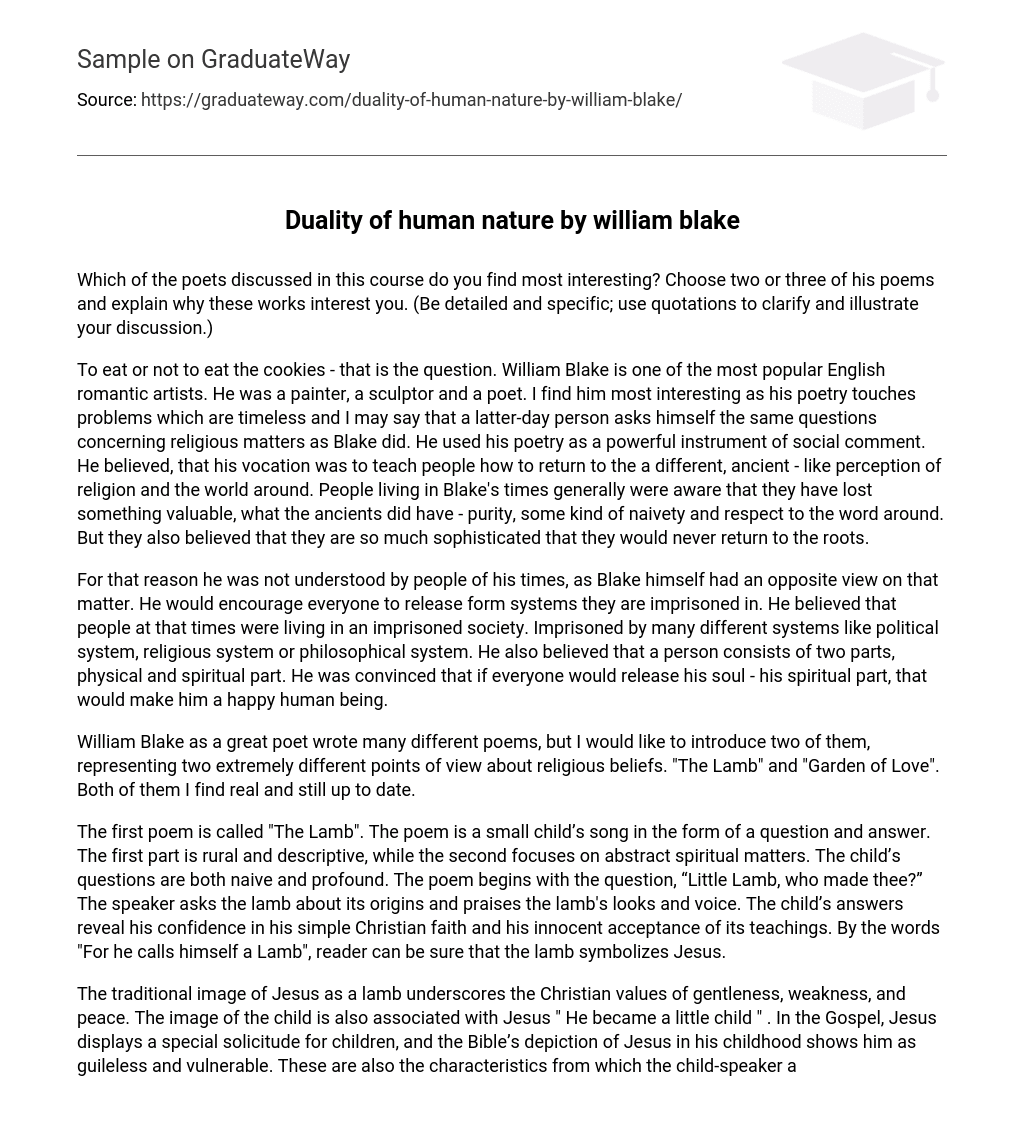Which of the poets discussed in this course do you find most interesting? Please choose two or three of their poems and provide a detailed explanation of why these works captivate you. Use quotations to support and exemplify your argument.
William Blake, a popular English romantic artist, was known for his skills in painting, sculpture, and poetry. What I find most intriguing about him is his ability to address timeless issues in his poetry, particularly regarding religious matters. Blake used his poetry as a powerful tool to make social commentary. He believed that his purpose was to guide people back to a different, ancient way of perceiving religion and the world around them. During Blake’s time, people were aware that they had lost something valuable that the ancients possessed – a sense of purity, innocence, and reverence for the world. However, they also believed that they were too sophisticated to ever return to their roots.
Blake’s unique perspective was not comprehended by his contemporaries as he fundamentally diverged from their beliefs. He advocated for individuals to emancipate themselves from the societal structures that confined them, detailing the prevalent incarceration plaguing individuals during his era. These constraints were not limited to political, religious, or philosophical systems. Additionally, Blake posited that every individual possessed both a physical and spiritual facet and asserted that true happiness could be achieved by emancipating one’s soul – the spiritual component within them.
William Blake, a renowned poet, composed numerous poems that showcase diverse perspectives on religious beliefs. Today, I would like to showcase two of his works, “The Lamb” and “Garden of Love,” which present starkly contrasting viewpoints. Despite their age, I find both poems to be profound and relevant even now.
The initial poem, titled “The Lamb”, is a childlike song presented in a question and answer format. It combines both rural and descriptive elements with abstract spiritual themes. The child’s inquiries possess both naivety and depth. It commences with the query, “Little Lamb, who created you?” The speaker inquires about the lamb’s origins while also admiring its appearance and voice. The child’s responses exhibit a steadfast belief in their simple Christian faith and an innocent acceptance of its teachings. Through the phrase “For he calls himself a Lamb”, readers can ascertain that the lamb represents Jesus.
The Christian values of gentleness, weakness, and peace are emphasized in the traditional portrayal of Jesus as a lamb. Additionally, Jesus is often associated with the image of a child, as he himself became a little child. In the Gospel, Jesus shows a special care for children, and his childhood as depicted in the Bible portrays him as innocent and vulnerable. These are also the qualities that the child-speaker in this poem associates with nature and God. Similar to other poems in the “Songs of Innocence” collection, this poem embraces the positive aspects of conventional Christian belief as seen by Blake.
The poem “Garden of Love” presents a contrasting perspective to Blake’s viewpoint. It tells the story of a person revisiting a childhood play area known as the Garden of Love. This individual, who is identified as a Christian adult, used to find happiness and peace in this place. However, upon returning to the garden, they discover the presence of a newly constructed chapel. This chapel symbolizes the intrusion of Christianity into a once untainted environment. As the protagonist enters the chapel, they experience feelings of sadness and melancholy. To their dismay, they find that the doors are closed and they are unable to gain access. This situation reflects Blake’s negative stance towards organized religion and God.
In summary, the two poems portray contrasting perspectives on religious beliefs and people’s attitudes toward God. Additionally, they highlight the duality of human nature. As children, we are unaffected by concepts of evil and regulations. We embrace our innate innocence and seek happiness and love without hesitation. Therefore, if given a choice, we would naturally opt for eating the cookies as it brings us pleasure.
Growing up means adhering to the rules set by The Church, where self-indulgence is considered forbidden and sinful. The adult perception of God and religion revolves around restrictions and mandates. I completely align with Blake’s perspective and share a desire for a society of mature individuals.





